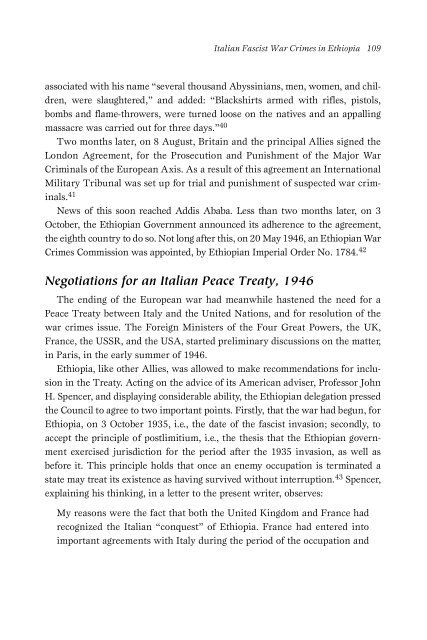Italian Fascist War Crimes in Ethiopia - Societa italiana di storia ...
Italian Fascist War Crimes in Ethiopia - Societa italiana di storia ...
Italian Fascist War Crimes in Ethiopia - Societa italiana di storia ...
You also want an ePaper? Increase the reach of your titles
YUMPU automatically turns print PDFs into web optimized ePapers that Google loves.
<strong>Italian</strong> <strong>Fascist</strong> <strong>War</strong> <strong>Crimes</strong> <strong>in</strong> <strong>Ethiopia</strong> 109<br />
associated with his name “seve ral thousand Abyss<strong>in</strong>ians, men, women, and child<br />
ren, we re slaughtered,” and added: “Blackshirts armed with rifles, pistols,<br />
bombs and flame-throwers, we re turned loose on the natives and an appall<strong>in</strong>g<br />
m a s s a c re was carried out for three day s . ” 4 0<br />
T wo months later, on 8 August, Brita<strong>in</strong> and the pr<strong>in</strong>cipal Allies signed the<br />
London Agreement, for the Prosecution and Punishment of the Major Wa r<br />
Crim<strong>in</strong>als of the European Axis. As a result of this agreement an International<br />
Military Tribunal was set up for trial and punishment of suspected war crimi<br />
n a l s . 41<br />
N ews of this soon reached Ad<strong>di</strong>s Ababa. Less than two months later, on 3<br />
O c t o b e r, the <strong>Ethiopia</strong>n Government announced its adherence to the agre e m e n t ,<br />
the eighth country to do so. Not long after this, on 20 May 1946, an <strong>Ethiopia</strong>n Wa r<br />
<strong>Crimes</strong> Commission was appo<strong>in</strong>ted, by <strong>Ethiopia</strong>n Imperial Order No. 1784. 4 2<br />
Negotiations for an <strong>Italian</strong> Peace Treaty, 1946<br />
The end<strong>in</strong>g of the European war had meanwhile hastened the need for a<br />
Peace Treaty between Italy and the United Nations, and for resolution of the<br />
war crimes issue. The Foreign M<strong>in</strong>isters of the Four Great Powers, the UK,<br />
France, the USSR, and the USA, started prelim<strong>in</strong>ary <strong>di</strong>scussions on the matter,<br />
<strong>in</strong> Paris, <strong>in</strong> the early summer of 1946.<br />
<strong>Ethiopia</strong>, like other Allies, was allowed to make recommendations for <strong>in</strong>clusion<br />
<strong>in</strong> the Tre a t y. Act<strong>in</strong>g on the advice of its American adviser, Professor John<br />
H. Spencer, and <strong>di</strong>splay<strong>in</strong>g considerable ability, the <strong>Ethiopia</strong>n delegation pre s s e d<br />
the Council to agree to two important po<strong>in</strong>ts. Firstly, that the war had begun, for<br />
<strong>Ethiopia</strong>, on 3 October 1935, i.e., the date of the fascist <strong>in</strong>vasion; secondly, to<br />
accept the pr<strong>in</strong>ciple of postlimitium, i.e., the thesis that the <strong>Ethiopia</strong>n gove r n-<br />
ment exe rcised juris<strong>di</strong>ction for the period after the 1935 <strong>in</strong>vasion, as well as<br />
b e f o re it. This pr<strong>in</strong>ciple holds that once an enemy occupation is term<strong>in</strong>ated a<br />
state may treat its existence as hav<strong>in</strong>g survived without <strong>in</strong>terruption. 4 3 S p e n c e r,<br />
expla<strong>in</strong><strong>in</strong>g his th<strong>in</strong>k<strong>in</strong>g, <strong>in</strong> a letter to the present writer, observe s :<br />
My reasons were the fact that both the United K<strong>in</strong>gdom and France had<br />
recognized the <strong>Italian</strong> “conquest” of <strong>Ethiopia</strong>. France had entered <strong>in</strong>to<br />
important agreements with Italy dur<strong>in</strong>g the period of the occupation and

















